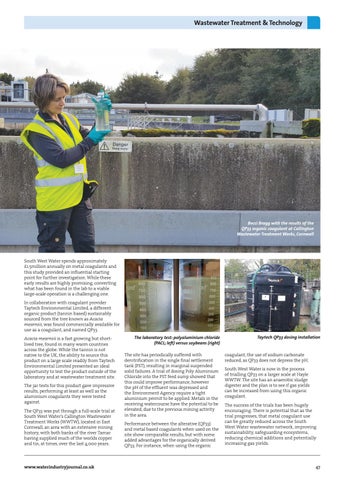Wastewater Treatment & Technology
Becci Bragg with the results of the QP33 organic coagulant at Callington Wastewater Treatment Works, Cornwall
South West Water spends approximately £1.5million annually on metal coagulants and this study provided an influential starting point for further investigation. While these early results are highly promising, converting what has been found in the lab to a viable large-scale operation is a challenging one. In collaboration with coagulant provider Taytech Environmental Limited, a different organic product (tannin based) sustainably sourced from the tree known as Acacia mearnsii, was found commercially available for use as a coagulant, and named QP33. Acacia mearnsii is a fast growing but shortlived tree, found in many warm countries across the globe. While the tannin is not native to the UK, the ability to source this product on a large scale readily from Taytech Environmental Limited presented an ideal opportunity to test the product outside of the laboratory and at wastewater treatment site. The jar tests for this product gave impressive results, performing at least as well as the aluminium coagulants they were tested against. The QP33 was put through a full-scale trial at South West Water’s Callington Wastewater Treatment Works (WWTW), located in East Cornwall, an area with an extensive mining history, with both banks of the river Tamar having supplied much of the worlds copper and tin, at times, over the last 4,000 years.
www.waterindustryjournal.co.uk
The laboratory test: polyaluminium chloride (PACL; left) versus soybeans (right) The site has periodically suffered with denitrification in the single final settlement tank (FST), resulting in marginal suspended solid failures. A trial of dosing Poly Aluminium Chloride into the FST feed sump showed that this could improve performance, however the pH of the effluent was depressed and the Environment Agency require a tight aluminium permit to be applied. Metals in the receiving watercourse have the potential to be elevated, due to the previous mining activity in the area. Performance between the alterative (QP33) and metal based coagulants when used on the site show comparable results, but with some added advantages for the organically derived QP33. For instance, when using the organic
Taytech QP33 dosing installation coagulant, the use of sodium carbonate reduced, as QP33 does not depress the pH. South West Water is now in the process of trialling QP33 on a larger scale at Hayle WWTW. The site has an anaerobic sludge digester and the plan is to see if gas yields can be increased from using this organic coagulant. The success of the trials has been hugely encouraging. There is potential that as the trial progresses, that metal coagulant use can be greatly reduced across the South West Water wastewater network, improving sustainability, safeguarding ecosystems, reducing chemical additions and potentially increasing gas yields.
47
